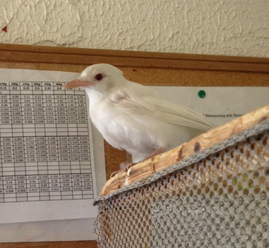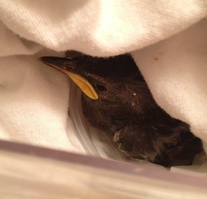 by duckteeth » Sun Sep 07, 2014 11:29 am
by duckteeth » Sun Sep 07, 2014 11:29 am
CAT ATTACKS
Outdoor cats are frequent killers of birds and small mammals. Most of the steps described here can also be followed in the case of your cat attacking a small mammal (rabbits, squirrels, etc.)
In this situation, wildlife rehabilitation clinics are your best friends. You can use
this website to find one to contact near you.
IMPORTANT CAT FACTS
1. Cats have a bacteria in their nails and mouth that is fatal to birds. It's the same bacteria that causes your skin to swell up a little around a cat scratch or bite, but is not fatal to most people.
2. Cats will hunt birds regardless of whether or not they are hungry. A cat's urge to hunt is separate from its level of hunger. Even the most well fed pet cat will hunt birds if left outside unsupervised.
3. Even cats with bell collars can catch birds. While the sound might alert you to the location of your cat, its not a sound that bird necessarily associate with danger or predators.PREVENTING CAT ATTACKSThis website has more tips on preventing cat attacks and keeping birds safe. 1. Keep your cat indoors.
○ This is the best thing you can do to prevent cat attacks.
○ An indoor cat can't get to birds and therefore can't kill them either.
○ If you must let your cat outside, do so on a leash or at least make sure its being supervised.
○ Keeping your cat(s) indoors is better than letting them roam free for other reasons as well.
2. Don't invite feral cats (strays) into your yard.
○ Don't leave out cans of cat food for them. Remember that a well fed cat will still hunt birds.
○ Report feral colonies to a local animal shelter so they can be either TNRd (trapped, neutered and returned), which will prevent the growth of the colony, or adopted if they're tame enough to be pets.
○ This is benefits the birds, the cats and the whole neighborhood.
3. Trim your cats claws regularly.
○ A cat with dull claws can't climb as easy and will have a harder time catching birds.
○ NOTE: DO NOT declaw your cat, especially if they're allowed to roam outside. Declawing is inhumane for reasons explained here and here
MY CAT ATTACKED A BIRD...
The best you can do is follow the steps below:
○ Make sure the bird is alive. If not, throw it out safely.
○ Prepare a small cardboard box/shoebox with a lid by lining it with newspaper and/or toilet paper.
○ Pick up bird with clean gloves and place it in the box, making sure the lid is on/top is closed and that it has air holes.
○ Cats have bacteria in their saliva and claws that is fatal to birds, so in this situation its important to get the bird to a rehabber as quickly as possible so that a life-saving anti-biotic can be administered.
○ Locate the nearest wildlife rehabilitation center. This website can help.
○ NOTE: Most veterinarians are not equipped, legally or otherwise, to deal with wildlife, especially birds. DO NOT bring an injured bird to a vet unless you have absolutely no other options.
○ Call the center and let them know the situation and that you're coming in to help them prepare for the bird.
○ Bring the bird to the rehab center, fill out whatever form they give you, and leave a donation if possible.
NEXT: Feeding WaterfowlLast edited by
duckteeth on Sat Sep 13, 2014 12:28 pm, edited 3 times in total.



